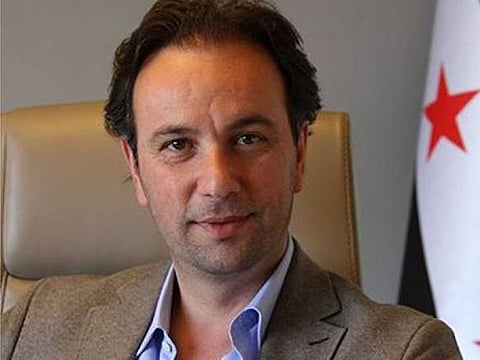Syrian opposition member Al Khoja enters Turkish politics
Move shows how many members of Syria’s opposition are merely Turkish ‘pawns’

Also In This Package
Damascus: The former president of the Syrian National Coalition, Khaled Al Khoja, is entering Turkish politics with a new name, new identity, and new party affiliation.
The dramatic change is raising the ire of the opposition street who trusted Al Khoja as a representative of their cause but are now saying that one cannot be a Syrian nationalist and a Turkish one at the same time.
“He was a pawn propped up by the Turks in Syrian politics,” said Ziad Haidar, a Barcelona-based Syrian journalist, who is the former correspondent for the Beirut daily Assafir in Damascus.
“His rehaul comes as little surprise.
Early into the current crisis, Ahmet Davutoglu came to Damascus and made a joint Turkish-Qatari-backed offer to the Syrians, to include the outlawed Syrian branch of the Muslim Brotherhood in a cabinet of national unity. That offer was flatly rejected.”
According to a Syrian law dating back to the 1980s, membership in the Muslim Brotherhood is a capital offense, punishable by death.
Close to Muslim Brotherhood
Al Khoja, who is close to the Brotherhood, was handpicked by Davutoglu to lead the Ankara-based branch of the Syrian opposition in 2015.
At the time, Davutoglu was serving as prime minister of Turkey, before he fell out with his former boss and patron, President Recep Tayyip Erdogan.
“It’s impossible for someone of such caliber to be loyal to Syria,” added Haidar to Gulf News.
Other Turkish proxies in the Syrian conflict have frequently championed Turkish nationalism, raising eyebrows among seculars, independents, and Arab nationalists in Syrian opposition ranks.
They raised the Turkish Flag side-by-side with that of the Syrian opposition, and in territory occupied by Turkey since 2016, are using the Turkish lira and Turkish language at schools.
President Erdogan’s photograph is framed in offices throughout cities like Jarablus, Afrin, and Azaz.
He has promised to repatriate 2 million Syrian refugees currently living in Turkey in the safe zone that he has carved out along the Syrian-Turkish border.
Founding Member of Turkey’s Future Party
Now using his Turkish name “Halit Aptekin Hocaglu” Al Khoja is standing as one of 154 founders of the Turkish Future Party (Gelecek Partisi in Turkish), announced last Friday by Davutoglu.
It plans to challenge Erdogan’s Justice and Development Party (AKP) from which Davutoglu resigned in April 2018.
Other co-founders include Etyen Mahcupyan, an Armenian-Turkish journalist, Hakan Albayrak, an Islamic writer, and Ibrahim Turhan, a Turkish economist.
The party promises to usher a new democracy within Turkey, supporting the use of non-Turkish languages in schools, including Kurdish.
Turkish state-run media boycotted the party launch on December 13, due to Erdogan’s displeasure with Davutoglu’s political maneuvers.
Who is Al Khoja?
The Wikipedia entry for Khaled Al Khoja now reads that he is a “Syrian-Turkish politician,” born in Damascus in 1965 “to a Turkish family.”
He was educated at the Faculty of Medicine at the University of Izmir, and prior to the current conflict, was completely unknown in Syrian politics.
“This will further de-legitimize the Syrian opposition as a force seeking the national interests of Syrians,” said Kamal Chomani, a non-resident fellow at The Tahrir Institute for Middle East Policy.
Speaking to Gulf News, he added: “This further proves that the Syrian opposition has always been and will always be an extension of Turkish expansionist policies in the region. Likewise, the new Future Party seems to have taken the Syrian crisis as a field of their work eying on the Syrians who may eventually end up in Turkey.”
Khaled Al Khoja’s identity shift comes 80 years after another Syrian politician, Soubhi Barakat crossed the border into Turkey, took on a Turkish identity, and ran for the Turkish parliament as an MP for Alexandretta, Syrian territory on the eastern Mediterranean coast of Turkey, which was annexed to Turkey prior to World War II.
During his previous career in Syria, Barakat had served as head of state in the 1920s and parliament speaker in 1932-1936.
Sign up for the Daily Briefing
Get the latest news and updates straight to your inbox



